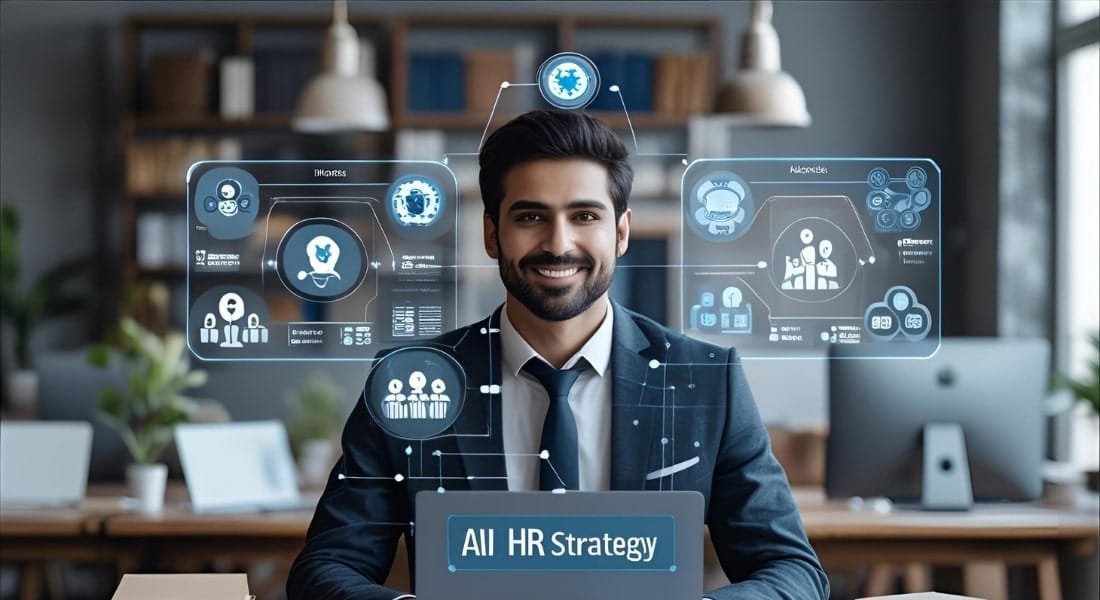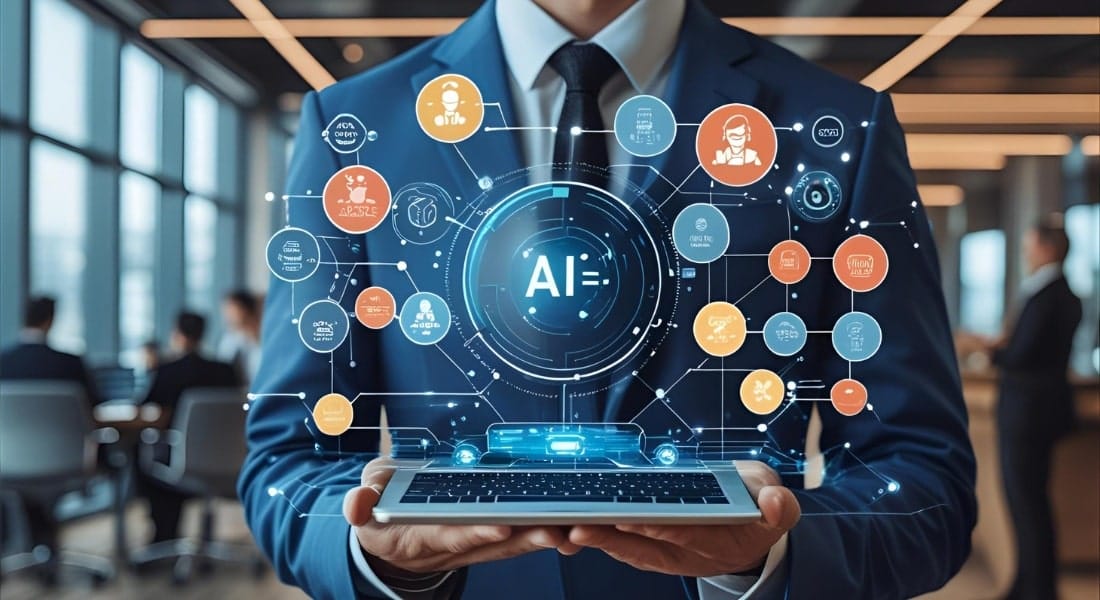- Introduction to AI in HR Leadership
- Core Areas Where HR Leaders Should Apply AI
- Benefits of Integrating AI into HR Strategy
- Challenges and Ethical Considerations
- Case Studies / Examples of HR Leaders Using AI
- Actionable Steps for HR Leaders to Adopt AI
- The Future of HR Leadership with Artificial Intelligence
- FAQs
In today’s rapidly evolving business landscape, HR leaders leveraging AI are gaining a significant competitive edge. This article explores how a modern HR strategy with AI is no longer a futuristic concept but a present-day necessity. By understanding and implementing artificial intelligence in HR leadership, organizations can optimize their talent management, boost employee engagement, and drive overall business success. This guide will navigate the core areas where AI can be strategically applied, the benefits it offers, potential challenges, real-world examples, and actionable steps for HR leaders embarking on this transformative journey. Embracing AI-driven HR practices is crucial for any forward-thinking organization aiming for true human resources AI transformation.
Introduction to AI in HR Leadership
The integration of machine learning in HR and other forms of AI-powered human resources is fundamentally reshaping the role of HR leaders. No longer solely focused on administrative tasks, modern HR leaders are now empowered by HR tech innovation to make data-driven decisions, automate repetitive processes, and focus on strategic initiatives. Digital HR leadership necessitates a deep understanding of how AI can augment human capabilities, leading to more efficient and effective talent management strategies. This shift requires HR leaders to evolve from traditional operational roles to strategic partners who can harness the power of data and technology to achieve organizational goals.
Core Areas Where HR Leaders Should Apply AI

AI offers a wide range of applications across the HR spectrum. Strategic implementation in the following core areas can yield significant results:
AI in Talent Acquisition
Talent acquisition with AI is revolutionizing how organizations find and attract top talent. AI-powered tools can analyze vast datasets of resumes and candidate profiles, identify ideal matches based on skills and experience, and automate initial screening processes. Recruiting automation through AI chatbots can engage with candidates, answer their queries, and schedule interviews, freeing up recruiters to focus on more complex tasks like candidate relationship management and final selection. This leads to faster hiring cycles, reduced recruitment costs, and improved quality of hires.
AI in Employee Engagement and Experience
Understanding and improving employee engagement is crucial for retention and productivity. People analytics powered by AI can analyze employee feedback, communication patterns, and performance data to identify trends and potential issues impacting engagement. Predictive HR models can even anticipate employees at risk of leaving, allowing HR leaders to proactively address their concerns. AI-driven personalization of learning and development programs can also enhance the employee experience, making training more relevant and impactful.
AI in Performance Management
Traditional performance reviews can be time-consuming and often subjective. AI can introduce more objective and continuous performance management processes. Natural language processing (NLP) can analyze feedback from various sources, including project reports and peer reviews, to provide a more holistic view of employee performance. AI-powered tools can also help set more realistic and data-driven goals, track progress, and provide personalized feedback and coaching recommendations.
AI in Workforce Analytics and Planning
Workforce analytics leverages data to gain insights into an organization’s human capital. AI significantly enhances these capabilities by analyzing large and complex datasets to identify trends, predict future workforce needs, and optimize resource allocation. Predictive HR models can forecast talent gaps, identify skill shortages, and help HR leaders make proactive decisions regarding hiring, training, and internal mobility. This data-driven approach enables more strategic workforce planning and better alignment of talent with business objectives.
AI in Learning and Development
AI can personalize learning paths based on individual employee needs, skills gaps, and career aspirations. AI-powered platforms can recommend relevant training materials, suggest mentors, and track learning progress. Chatbots can provide on-demand support and answer employee questions related to training and development. This personalized approach leads to more effective learning outcomes and a more skilled and adaptable workforce.
Benefits of Integrating AI into HR Strategy

The strategic integration of AI into HR offers numerous compelling benefits:
- Increased Efficiency and Productivity: Automating repetitive tasks frees up HR professionals to focus on more strategic and human-centric activities.
- Improved Decision-Making: Data-driven insights from AI-powered analytics lead to more informed and effective talent management decisions.
- Enhanced Candidate and Employee Experience: Personalized interactions and faster processes improve satisfaction and engagement.
- Reduced Costs: Automation and optimized resource allocation can lead to significant cost savings in recruitment, training, and HR administration.
- Better Talent Acquisition: AI can identify and attract higher-quality candidates more efficiently.
- Increased Employee Retention: Understanding and addressing factors impacting engagement can reduce turnover.
- Data-Driven Insights: AI provides valuable insights into workforce trends, performance, and potential risks.
Challenges and Ethical Considerations
While the benefits of AI in HR are significant, HR leaders must also be mindful of the challenges and ethical considerations:
- Data Privacy and Security: Handling sensitive employee data requires robust security measures and compliance with privacy regulations.
- Bias in Algorithms: AI algorithms trained on biased data can perpetuate and even amplify existing biases in hiring and performance management. Ensuring fairness and equity requires careful monitoring and validation of AI systems.
- Implementation Costs and Complexity: Integrating new AI technologies can be expensive and require specialized expertise.
- Resistance to Change: Employees and HR professionals may resist the adoption of new technologies, requiring effective change management strategies.
- The Human Touch: While AI can automate tasks, maintaining the human element in HR interactions is crucial for building trust and strong employee relationships. HR leaders must find the right balance between automation and human interaction.
- Ethical Use of AI: Establishing clear ethical guidelines for the use of AI in HR is essential to ensure fairness, transparency, and accountability.
Case Studies / Examples of HR Leaders Using AI
Several forward-thinking organizations are already leveraging AI to transform their HR functions:
- Unilever: Uses AI-powered chatbots for initial candidate screening, resulting in faster hiring times and reduced recruiter workload (Source: Unilever case studies).
- IBM: Employs AI for personalized learning and development recommendations, improving employee skills and engagement (Source: IBM HR reports).
- Google: Utilizes people analytics extensively to understand employee behavior, predict attrition, and optimize team performance (Source: Google People Operations insights).
- Accenture: Implemented AI-driven tools for internal talent mobility, matching employees with new opportunities based on their skills and experience (Source: Accenture HR transformations).
These examples demonstrate the diverse ways in which modern HR strategy with AI is being successfully implemented to drive tangible business outcomes.
Actionable Steps for HR Leaders to Adopt AI

For HR leaders looking to integrate AI into their strategy, the following actionable steps are recommended:
- Identify Key HR Challenges: Determine the specific areas where AI can provide the most significant impact and address existing pain points.
- Educate Yourself and Your Team: Develop a strong understanding of AI technologies and their potential applications in HR. Provide training and resources to HR professionals to build their digital literacy.
- Start with Pilot Projects: Begin with small-scale AI implementations in specific areas to test their effectiveness and learn valuable lessons before wider adoption. For instance, pilot an AI in talent acquisition tool for screening candidates for a specific role.
- Focus on Data Quality and Infrastructure: Ensure that your HR data is accurate, complete, and well-structured to feed AI algorithms effectively. Invest in the necessary data infrastructure and analytics capabilities.
- Partner with Technology Experts: Collaborate with IT departments and external AI vendors to select and implement the right AI solutions for your organization’s needs.
- Prioritize Ethical Considerations: Establish clear guidelines for the ethical use of AI in HR and regularly audit AI systems for bias and fairness.
- Measure and Evaluate Results: Track the key metrics and outcomes of your AI initiatives to assess their impact and identify areas for improvement.
- Foster a Culture of Innovation: Encourage experimentation and continuous learning around AI within the HR function.
The Future of HR Leadership with Artificial Intelligence
The future of human resources AI transformation is poised to be even more profound. AI will likely become deeply embedded in all aspects of HR, from predicting future talent needs with greater accuracy to providing personalized employee experiences at scale. AI-driven HR practices will empower HR leaders to move beyond transactional tasks and focus on strategic initiatives that drive organizational growth and competitive advantage. Digital HR leadership will require a continuous adaptation to new technologies and a focus on leveraging AI to create a more engaged, productive, and future-ready workforce. The ability to strategically integrate and ethically manage artificial intelligence in HR leadership will be a defining characteristic of successful HR organizations in the years to come.
Meta Title: AI in HR: Modern Leaders Transforming Strategy (65 chars)
Meta Description: Discover how HR leaders leveraging AI are transforming their strategies. Learn about talent acquisition, analytics, ethical considerations, and actionable steps. (158 chars)
Featured Snippet Intro: Modern HR leaders should leverage AI to automate tasks, improve decision-making through workforce analytics, enhance candidate and employee experiences, and drive strategic talent management initiatives.
FAQs
Q: What are the key benefits of using AI in HR? A: Key benefits include increased efficiency, improved decision-making, enhanced candidate and employee experience, reduced costs, and better talent acquisition.
Q: What are some ethical considerations when implementing AI in HR? A: Ethical considerations include data privacy and security, bias in algorithms, and maintaining the human touch in HR interactions.
Q: How can AI help with talent acquisition? A: AI can automate resume screening, identify ideal candidates, engage with applicants through chatbots, and schedule interviews.
Q: What is workforce analytics, and how does AI enhance it? A: Workforce analytics involves using data to gain insights into human capital. AI enhances it by analyzing large datasets to identify trends, predict future needs, and optimize resource allocation.
Q: What are some actionable steps for HR leaders to adopt AI? A: Actionable steps include identifying key challenges, educating the team, starting with pilot projects, focusing on data quality, and partnering with technology experts.
Call to Action: The time to embrace the AI-powered human resources revolution is now. By strategically integrating AI into your HR strategy, you can unlock unprecedented levels of efficiency, insights, and impact. Start exploring the possibilities today and position your organization for future success.


